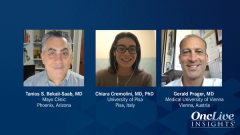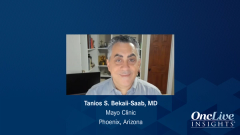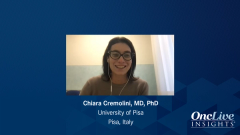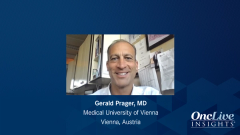
Overview of Colorectal Cancer
Tanios S. Bekaii-Saab, MD, Gerald Prager, MD, and Chiara Cremolini, MD, PhD, provide insight on the treatment landscape and international screening guidelines of colorectal cancer.
Episodes in this series

Tanios S. Bekaii-Saab, MD: Hello, and welcome to this OncLive® Insights® program titled “My Treatment Approach: Metastatic Colorectal Cancer.” My name is Tanios Bekaii-Saab. I’m at the Mayo Clinic. I lead the GI [gastrointestinal] cancer program and practice on our campus in Phoenix, Arizona. I’m pleased to be leading today’s discussion, along with 2 of my wonderful colleagues, Dr. Chiara Cremolini and Dr. Gerald Prager. Chiara and Gerald, please introduce yourselves.
Chiara Cremolini, MD, PhD: Hello, everybody. I’m Chiara Cremolini. I’m a medical oncologist. I’m a professor of medical oncology at the University of Pisa in Italy. I’m mainly interested in the management of colorectal cancer and in the conduction of academic clinical trials in this field.
Gerald Prager, MD: My name is Gerald Prager. I’m from the Medical University of Vienna [Austria]. I’m also a medical oncologist. I heading the GI cancer program at our institution, and I also head the precision medicine in oncology program. This is a very good opportunity to combine these 2 programs in favor for our patients. I’m happy to be here with you.
Tanios S. Bekaii-Saab, MD: Glad to be with the 2 of you. Hope to see you live soon at some point, maybe at ESMO GI [European Society for Medical Oncology World Congress on Gastrointestinal Cancer]. Colorectal cancer is 1 of the most common cancers in the world, and but it’s also 1 of the more preventable cancers with screening. Screening certainly helps but does not eliminate it 100%. More screening means earlier stages of cancers are diagnosed, which enhances the likelihood of survival. A lot of our patients unfortunately still present in later stages, and we continue to create opportunities for our patients to live longer and live better— quality of life along with quantity.
It’s said that between 10% and 20% of patients with colorectal cancer have a familial pattern. We know many of the drivers, such as Lynch syndrome. But there are a lot others that we know about and many more that we’re still learning about. One thing that is a tragedy is the increasing incidence of early onset colorectal cancer, in younger patients. We’re seeing that across the planet. It’s not just the United States or even a European phenomenon; it’s everywhere. That has been rising to the level of an epidemic. We see those in our clinics all the time. Many are rectal, but also we find right-sided tumors. These are patients without any patterns that suggest an inherited pattern. There are a lot of thoughts about why could that be. A lot of studies are looking at lifestyle, potentially implicating microbiome, but I don’t think we clearly understand why. A lot of work is being done.
In the United States, the age of screening is 45 instead of 50 years old. It got down to 45, and I suspect that it will be 40. It’s 40 in some populations, but I suspect it’s going to be 40 for overall. Gerald, Chiara, I don’t know about Europe. Was the age of first colonoscopy also dropped?
Gerald Prager, MD: Yeah, I can start to answer this. We’ve performed a big colon cancer study in Austria looking at the onset age of colorectal cancer, and indeed we see a slight trend. The difference is we see male patients a little younger than female patients, which leads to the recommendation to start the screening program in men at 45 years. It’s still 50 in female patients. I totally agree with you. As we see more younger patients with no family history, there should be a drop in the age when we start screening people.
Chiara Cremolini, MD, PhD: In Italy, the test that’s proposed for the screening of colorectal cancer is not a colonoscopy but the fecal occult blood test. All people between 50 and 70 years old are invited to participate in this screening program. Unfortunately, the rate of success of this campaign and, in particular, the adherence to the screening procedures is not so high, even if it’s a noninvasive test. It’s around 60% to 65%, and it’s much different in regions of northern Italy than in southern Italy, where it’s even lower than 60%. However, I definitely agree that because of the rising burden of early onset colorectal cancer, it appears…to understand the reasons but especially to anticipate the diagnosis. We should also consider that early onset colorectal cancer is often diagnosed in advanced stages. A diagnostic delay is probably related to the fact that the people feel too strong to be affected by this illness. That’s the reason why a lot of colorectal cancer among younger people is detected at advanced stages.
Tanios S. Bekaii-Saab, MD: Yeah, I know. It’s very interesting. The patterns are very similar across the world, and I agree that 1 of the limiting factors is essentially the reluctance of folks to get screened. In the United States, it’s between 50% and 60%. Even in places like Canada and probably your parts of the world, where access is not an issue—unlike the United States, where access can be an issue—we’re still limited by how many we screen. What we’ve seen in the United States is a growth of Cologuard looking at stool DNA. That has been a lot of the work coming from our institution into underserved communities. Native Alaskans and Native Americans have increased quite a bit their rates of screening. We continue to hope that this will become more available and facilitate additional screening. Ultimately, this is the best way to prevent or have patients present early with their cancer.
Transcript Edited for Clarity









































